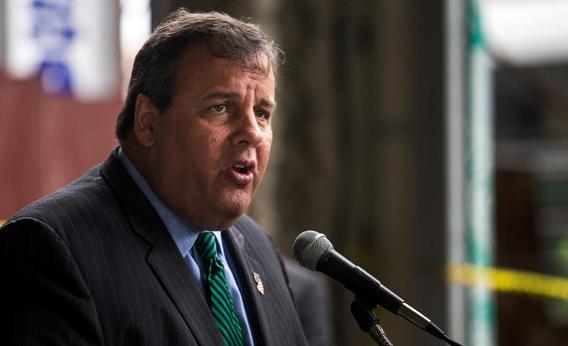Two summers ago, after Indiana Gov. Mitch Daniels decided not to run for president, New Jersey Gov. Chris Christie was summoned to meet Henry Kissinger. “When he called me into his office,” Christie told Washington Post reporter Dan Balz, “he just said, ‘The country needs a change and you connect with people in a way that I haven’t seen a politician connect with someone in a long time.’ ”
Kissinger’s pitch is a highlight of Balz’s forthcoming campaign book Collision 2012. Christie, as other early readers have noted, hardly needs prodding to talk about how many “unsolicited phone calls” came in asking him to run. In context he’s fairly dazzled about the attention—and revealing about what the GOP icons and donors planned for him. He told Kissinger that he honestly didn’t think he could run yet.
“I haven’t given any deep thought to foreign policy,” Christie admitted.
“Don’t worry about that,” said Kissinger, according to Christie. “We can work with you on that. Foreign policy is instinct, it’s character, that’s what foreign policy is.”
The advice has started jumping off the page. At a Thursday forum with Republican governors in Aspen, Colo., Christie spoke with disgust about “this strain of libertarianism” from people “not on the front line” who were criticizing tactics in the war on terror.
“As a former prosecutor who was appointed by George W. Bush on Sept.10, 2001, I just want us to be very cautious,” said Christie. “What we as a country have to decide is: Do we have amnesia? Because I don’t. I remember what we felt like on Sept. 12, 2001.” A moderator floated the name of one possible amnesiac, Kentucky Sen. Rand Paul, and Christie ran with it. “I love all these esoteric debates we’re gettin’ into—these esoteric, intellectual debates. I want these people to come to New Jersey and sit across from the widows and the orphans and have that conversation. They won’t, because that’s a much tougher conversation.”
In less time than it takes a magician to saw a woman in half, Christie had morphed into Rudy Giuliani. Kissinger’s instincts were right: He’s not just a good demagogue, he’s in alignment with what the wise-man and donor classes want from their party.
There’s a certain indignity in writing about a presidential race three years before the party conventions. At some point a furloughed shipbuilder in Norfolk is going to get so tired of reading 2016 speculation instead of sequestration coverage that he’ll embed an ice pick in a pundit’s head, and the jury will let him off. But Christie’s remark was about what the GOP elite wants now. The donor class wants to restore a GOP that cuts taxes at home, wins wars abroad, and (for the moment) allows more immigrants to provide cheap labor.
They’ve been saying this for years. A while after the Kissinger meeting, Christie met with at least 50 and as many as 60 wealthy people, gathered together by Home Depot founder Ken Langone. (Politico’s Mike Allen, at the time, said 50; Balz says 60.) David Koch was there, as was hedge fund manager Paul Tudor Jones. The point of the meeting, according to Christie, was for Langone to tell him that “everyone in this room will raise every dollar you need.”
But what were their politics? Jones had donated to Obama in 2007—he’d co-sponsored a fundraiser with George Soros. Koch, bogeyman status aside, has said he supports legal gay marriage, decriminalized marijuana, and defense cuts. “It’s essential to be able to achieve spending reductions and maybe it’s going to require some tax increases,” he told Politico’s Ken Vogel in 2012. Even Langone served on New York Gov. Andrew Cuomo’s transition team.
These guys aren’t outliers. As Alec MacGillis points out in the New Republic, one of Christie’s most passionate wealthy backers is Paul Singer. That name curdles in the mouths of anti-gay marriage activists: Singer has given more than $4 million to gay rights causes, and gets some credit for New York’s 2012 marriage law. He also happens to consider the Obama administration dangerously weak on Israel, but he has company. Sheldon Adelson, who effectively set $100 million on fire with donations to 2012 GOP campaigns, is right-wing on Israel and labor unions and taxes and … that’s about it. “I’m basically a social liberal,” he told the Wall Street Journal last year. “I’m pro-choice. I’m pro-the DREAM Act.”
The resurgence of libertarianism in the GOP means different things to these donors—some of them are happy to see marijuana legalizers get their footing. By and large they want the party to get behind some form of immigration reform (Bob Perry, the old Swift Boat vets donor, was a believer). Rand Paul was aware of that when he rebranded himself as a possible reformer, saying enough to move the bill along with conservatives without actually endorsing their plan.
Alas, the pure libertarians aren’t compatible with the rest of their views. The donor class that wanted Christie, settled for Romney, and wants Christie again needs a candidate who’ll slash at regulation in office and come off patriotic (and pro-Israel) enough to actually get into office. There’s plenty of overlap with the conservative hawks who can feel the movement shifting away from them, but libertarians are more worried about the donors than the likes of Bill Kristol or Rep. Peter King. One example: Rand Paul’s circle worries that Paul Singer may become enamored of the idea of a pro-gay marriage hawk and boost Liz Cheney’s campaign for U.S. Senate.
Every week there’s another reminder that the GOP’s libertarian wing hasn’t truly overcome the Bush wing. Back in Aspen, Christie gave them more fresh evidence. “President Obama has done nothing to change the policies of the Bush administration in the war on terrorism,” he said. “I mean practically nothing. You know why? Because they work.”
